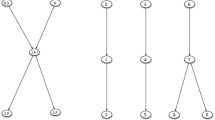We consider one of the central intractable problems of logical data analysis – finding maximal independent elements of partial orders (dualization of a product of partial orders). An important particular case is considered with each order a chain. If each chain is of cardinality 2, the problem involves the construction of a reduced disjunctive normal form of a monotone Boolean function defined by a conjunctive normal form. An asymptotic expression is obtained for a typical number of maximal independent elements of products for a large number of finite chains. The derivation of such asymptotic bounds is a technically complex problem, but it is necessary for the proof of existence of asymptotically optimal algorithms for the monotone dualization problem and the generalization of this problem to chains of higher cardinality. An asymptotically optimal algorithm is described for the problem of dualization of a product of finite chains.
Similar content being viewed by others
References
D. S. Jonson, M. Yannakakis, and C. H. Papadimitrious, “On general all maximal independent sets,” Inform. Process. Letts., 27, No. 3, 119–123 (1988).
M. Fredman and L. Khachiyan, “On the complexity of dualization of monotone disjunctive normal forms,” J. Algorithms, 21, 618–628 (1996).
E. Boros, K. Elbassioni, V. Gurvich, L. Khachiyan, K. Makino, “Dual-bounded generating problems: All minimal integer solutions for a monotone system of linear inequalities,” SIAM J. Comput., 31, No. 5, 1624–1643 (2002).
K. Elbassioni, “Algorithm for dualization over products of partially ordered sets,” SIAM J. Discr. Math., 23, No. 1, 487–510 (2009).
E. V. Dyukova, “An asymptotically optimal algorithm for the construction of dead-end tests,” Dokl. Acad. Nauk SSSR, 233, No. 4, 527–530 (1977).
E. V. Dyukova and P. A. Prokof’ev, “Asymptotically optimal dualization algorithms,” Zh. Vychisl. Mat. i Matem. Fiz., 55, No. 5, 895–910 (2015).
V. N. Noskov and V. A. Slepyan, “The number of dead-end tests for a class of tables,” Kibernetika, No. 1, 60–65 (1972).
E. V. Dyukova, G. O. Maslyakov, and P. A. Profov’ev, “Dualization over products of partial orders,” Mashinnoe Obuchenie i Analiz Dannykh, 3, No. 4, 239–249 (2017).
E. V. Dyukova, “Complexity of realization of some recognition procedures,” Zh. Vychisl. Mat. i Matem. Fiz., 27, No. 1, 114–127 (1987).
Author information
Authors and Affiliations
Corresponding author
Additional information
Translated from Prikladnaya Matematika i Informatika, No. 58, 2018, pp. 12–20.
Rights and permissions
About this article
Cite this article
Dyukova, E.V., Maslyakov, G.O. & Prokof’ev, P.A. Finding Maximal Independent Elements of Products of Partial Orders (The Case of Chains). Comput Math Model 30, 7–12 (2019). https://doi.org/10.1007/s10598-019-09429-y
Published:
Issue Date:
DOI: https://doi.org/10.1007/s10598-019-09429-y




